“Spending hours and hours in record shops. Listening to 50 bad records, listening to one average record, then listening to another 50 bad ones and maybe you’ll hear a good one if you’re lucky.”
Published on the 4th of March, 2023
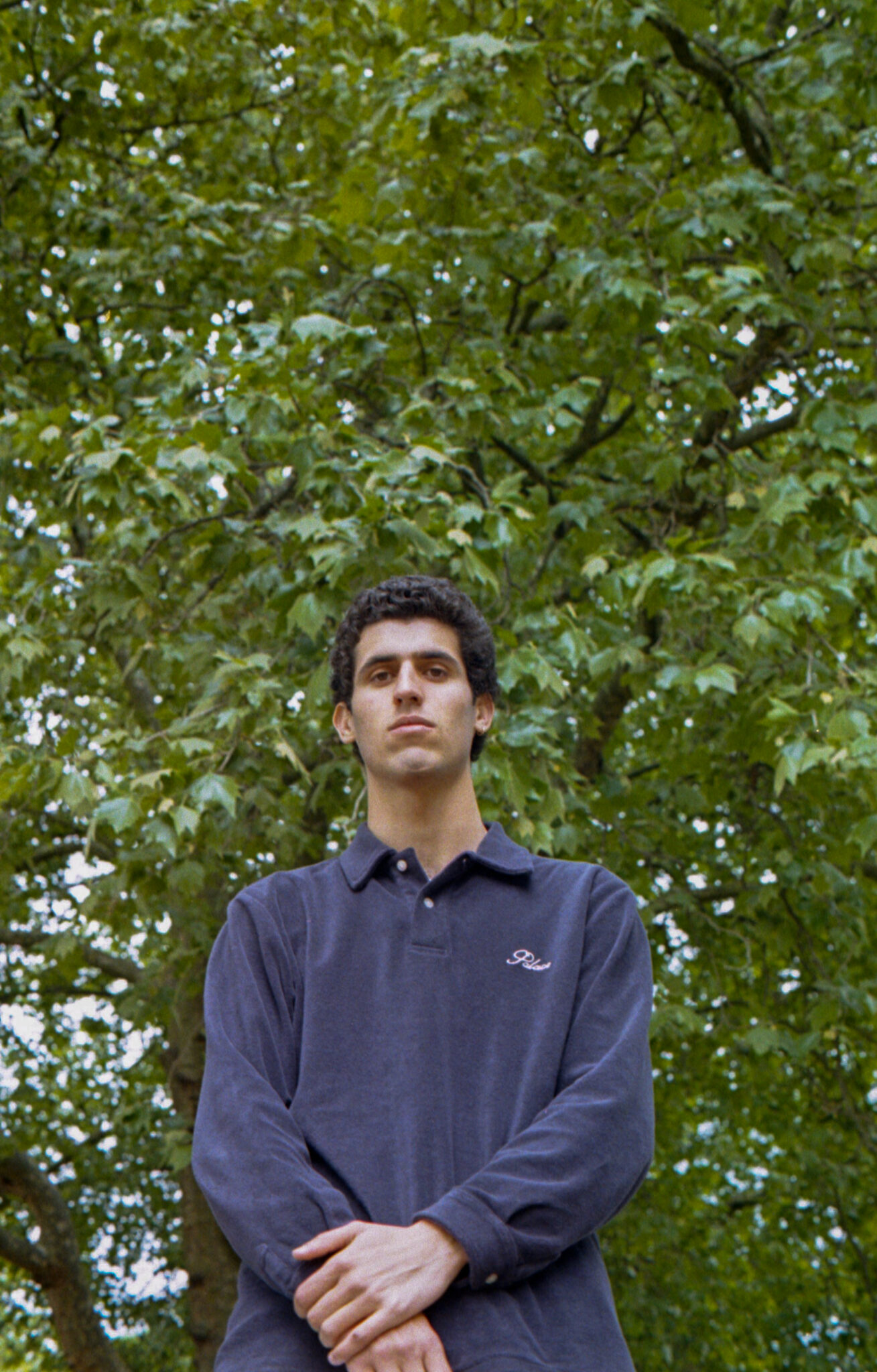
Nuno Espírito Santo is Stckman. The young Portuguese producer was born in 2002. It was in Lisbon that he grew up and gained his passion for music. In a sunny, happy, and relaxed Lisbon. The influence of Skateboarding and Surfing can be felt at distance in Stckman’s music which was influenced more and more by underground electronic music, techno, and house. In 2021, Nuno releases his debut album stckman, a record that transports us to late afternoons at the beach and drinking nights with friends: therefore, good times. Stckman, besides being an artist is also a DJ, so it’s normal to find him playing records at the most varied parties in Lisbon or London.
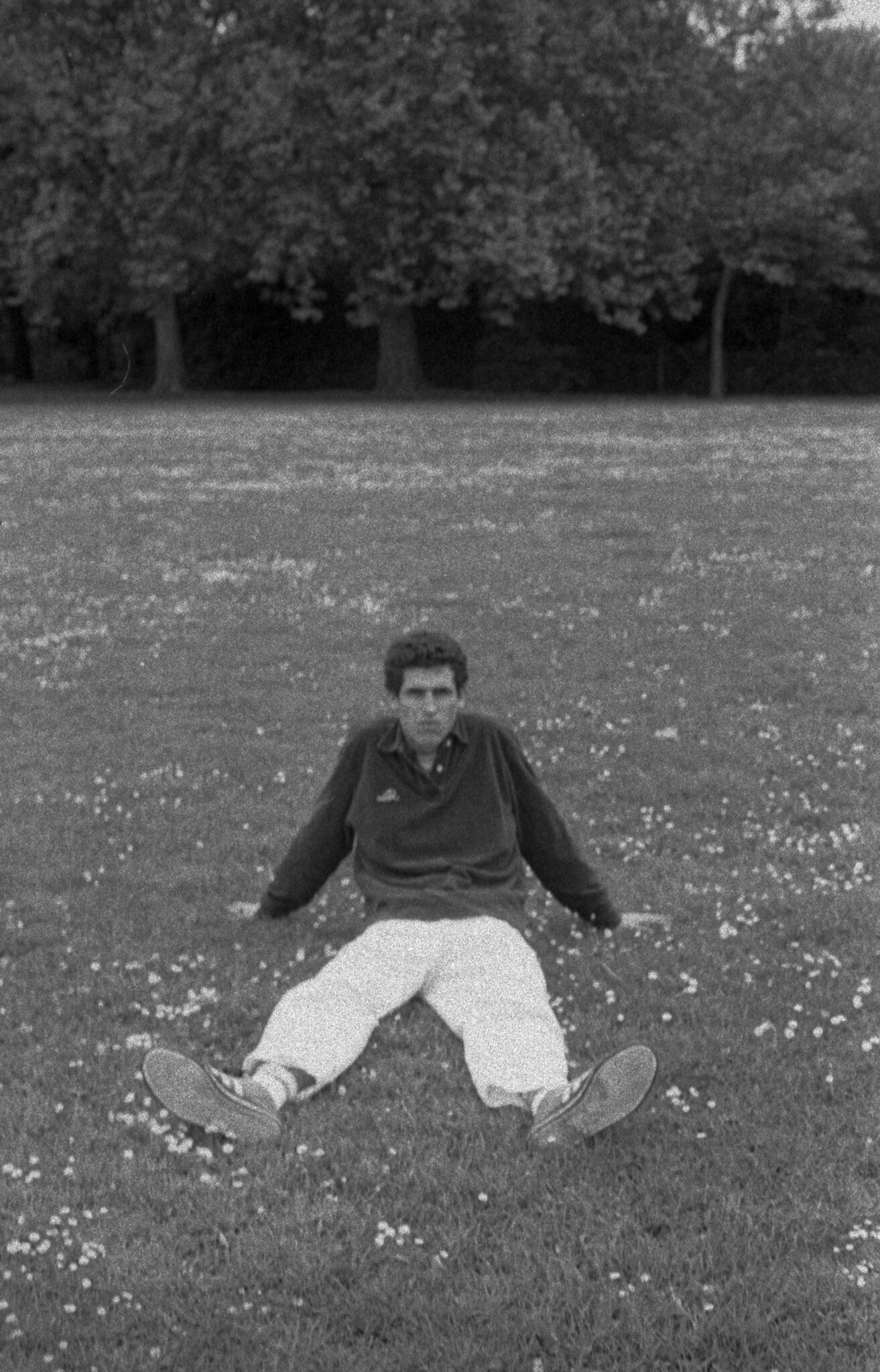
When we went to London for interviews in May 2022, Nuno didn’t hesitate to receive us for a chat. On the 12th of May 2022, we met at Victoria Park in East London. We talked about his journey, influences, and his first album stckman. We hope you enjoy reading this interview.
We recommend you have Stckman’s Spotify open by your side while reading the interview so that you can listen to any of the songs mentioned if wanted.
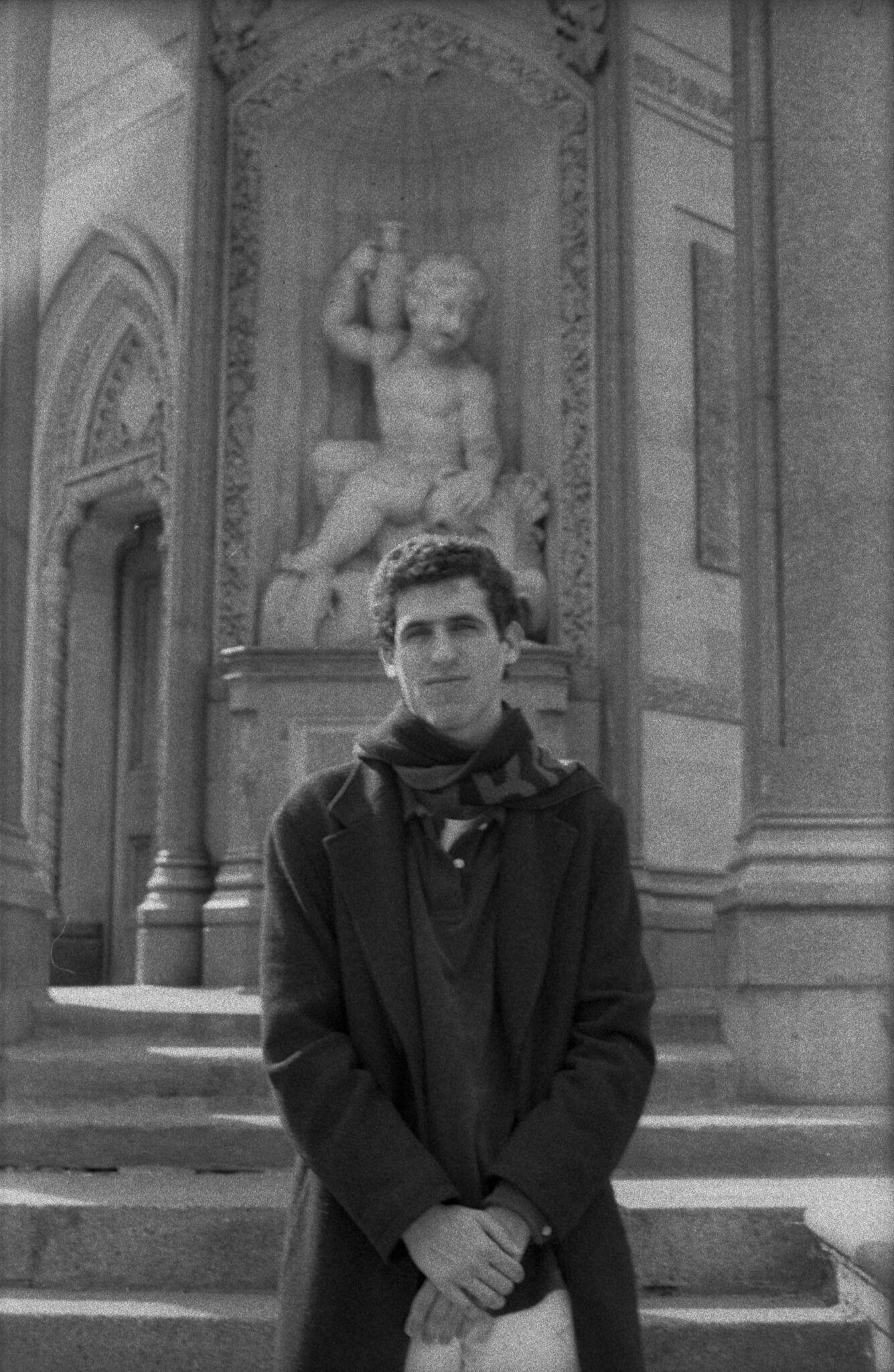
Nuno, would you say that your music is born from the fact that from an early age, you’ve been around Lisbon experiencing and discovering the city where you were born?
The place where I am has always influenced the music I make. It depends a lot of the people I’m with. That’s what defines the sound I make. Very few of my songs are made alone, so they are usually a combination of my energy (happy, Lisboner, and sunny) and the energy of the other people in the room. I believe my sound is the result of that combination.
Of course, the songs I make in Lisbon are much happier than the ones I produce here. But it’s good to have those sounds. It’s part of it. It can’t just be happy sounds. I think here I’m getting a much more realistic sound.
How did you learn to make music?
After trying all the programs: Ableton, FLStudio, and Logic and not being able to do anything I signed up for some classes at a school in Rato. A teacher called Tozé, a former DJ from Peniche, who taught there, taught me every Friday during my 6th and 7th grade. In those two years, he started explaining to me everything about how to make music. Only later, when I no longer had classes, with the help of Youtube, was when everything he had taught me started to come naturally to me. Suddenly, I already knew how to do things, because Tozé had already told me about them. Sometimes I would spend a week focusing only on one section of a song. Nowadays I don’t do that anymore, because I don’t make music as minimalist as before.
Do you think you had more attention to detail before?
I still do. I’m able to spend days and days on the things I want to finish. But in the old days, because I didn’t know so much, it took me longer to do things. Nowadays, I work more quickly.
How did you learn and master that efficiency and proactivity in the studio?
That’s all I know how to be. If I stay working on one thing for too long I get bored. Knowing how to let go of ideas is one of my best characteristics. I know how to say “enough” when I feel that something is not worthwhile. And I think that this mechanic of knowing how to say “enough” has made me do a lot of things differently. And now I do everything more quickly.
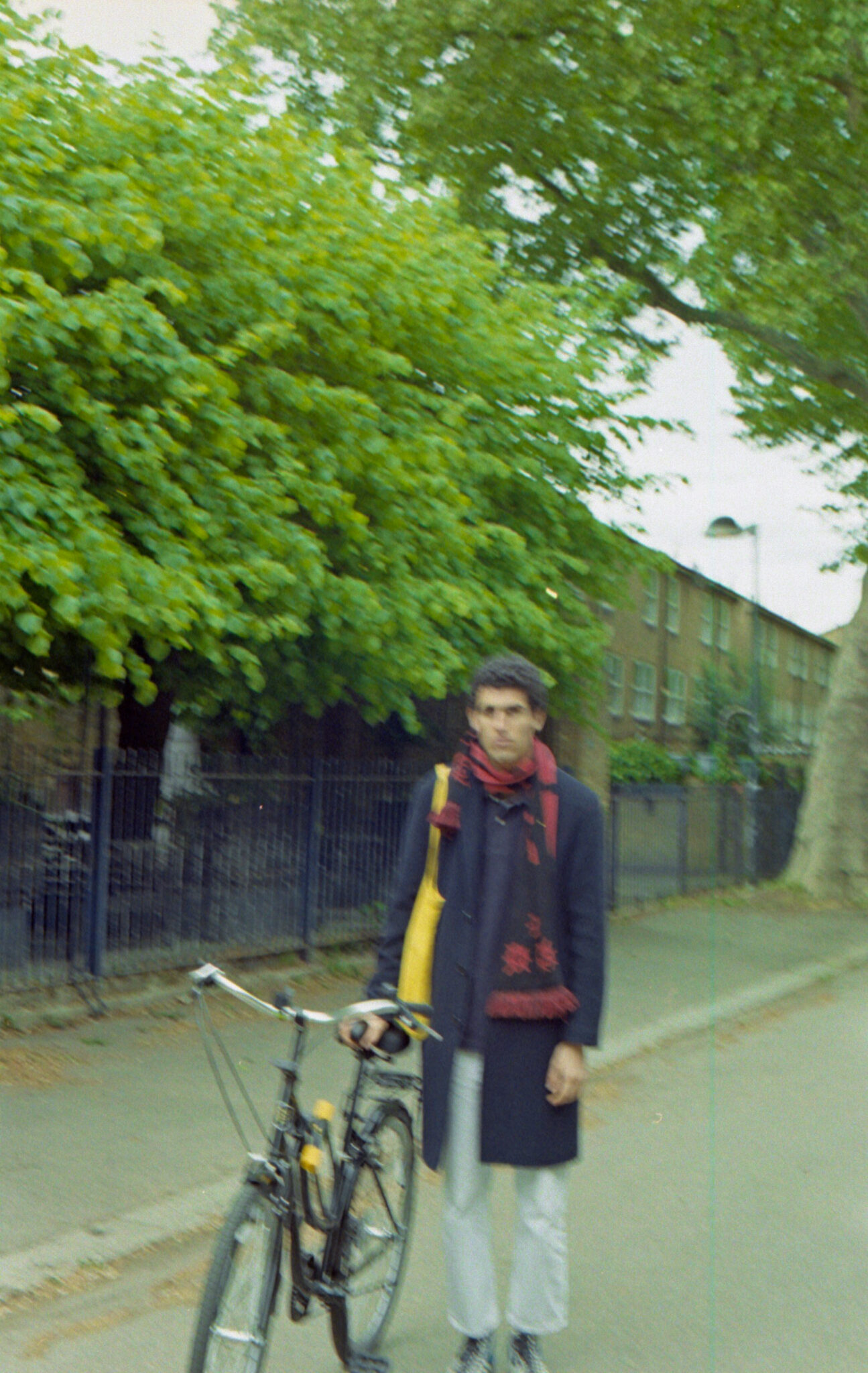

What do you think about the current state of music?
I think the pace at which you consume music is too fast. There’s a lot of good music, but the problem is there’s too much music. If you’re always putting out loads of music no one will listen to it. It’s important to let your music mature. At the same time, the culture of listening to an album no longer exists, because nobody creates it.
You created that culture when you decided to release an album.
Yes of course, because that’s one of my goals. I’ve learned that I like to listen to things that make sense. When I want to listen to music, I listen to albums because it’s something that was made to be heard from start to finish. So, I’ve learned from that and I’ve just done what I think is right for me.
What influence did Tyler, The Creator, and Odd Future have on you?
Gigantic. When I discovered them, they changed my life. I had something to guide me. It was really important for me to realize what I liked. Even though it wasn’t the sound that I was looking for, it became a sound that I started looking for.
I discovered Odd Future because of the lifestyle they led: the way they dressed and what they did. Then I started listening to the music they made, which made me realize what music is about. You don’t have to make music for others, you have to make music for yourself. Eventually, others will understand your thing. Any thing Odd Future did was cool because they were doing it and they were just doing shit that went against everything that was happening at the time.
Where does your creative process begin?
It’s usually a shared process. If someone knows how to play an instrument it all starts with that person playing it. I also like to use my drum machine to start ideas. I think the more times you go to the computer and try something the more ideas you’ll get. So even if you don’t finish the ideas at the moment, you can always explore them later. If I throw 100 things at the wall there must be 10 that will be good. I won’t finish all 100 clearly, but if I finish 10 I’ll be happy.

What is your process of discovering new music to play in your DJ sets like?
I listen to music every day and buy a record every day. I’ve found records so good it makes me want to find better ones. Digging. Spending hours and hours in record shops. Listening to 50 bad records, listening to one average record, then listening to another 50 bad ones and maybe you’ll hear a good one if you’re lucky.
I like finding underground records, that’s the best thing about it. When you can only hear those songs on that record. It’s beautiful. I feel good when I’m in record shops.
I wanted to address with you the design of your early singles. They had a very consistent and distinctive design. How did you come up with the idea for those designs?
I was inspired by an artist I like who is Mura Masa. He did a lot of covers with pictures and letters and I just adapted that design. Inspired by him I made my own version. At first, you can see a lot of similarities, but with each release, it gets a style of its own.
At the end of 2020, you moved to a new studio. Until then your studio was your bedroom, right?
Yes. I moved to a studio that was in an old school. It was a friend of my mum’s who lent it to me. We did several parties there during the pandemic. We also had parties in Madrid and we were even on the news in Madrid. It was all done underground and without publicity. They were parties where everybody went, but nobody went.
Why did you feel the need to leave your room?
Because my room is at my parent’s house. I couldn’t bring almost any people. The thing about music is that you have to create a space where you can be comfortable. It’s important to have the freedom to make a song at 5 am or 10 am. There are no restrictions. I needed my space and now I have my house. Which is perfect. I have my space and no one bothers me.
Interlude
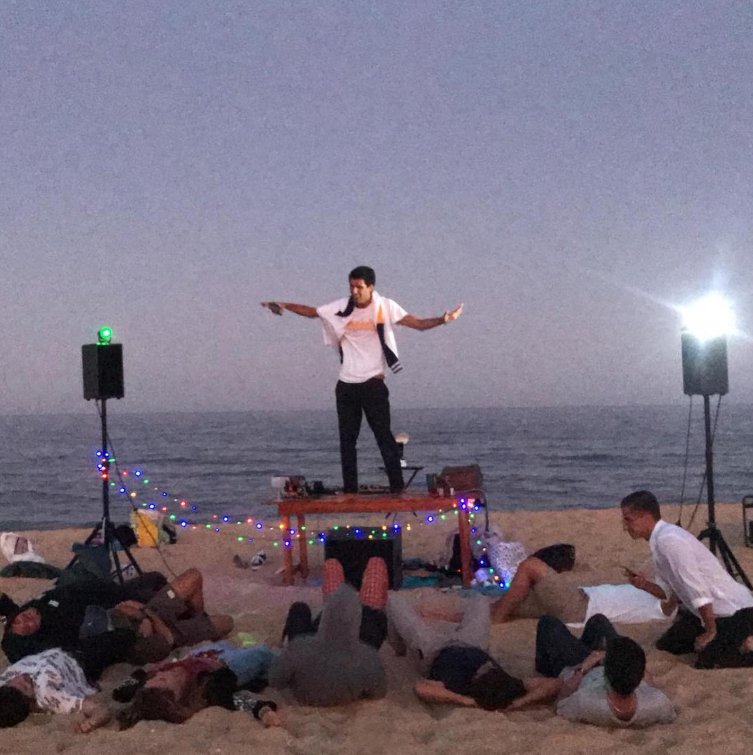
That picture is from a party we had on the beach in 2019. Just friends. Those were the survivors. I was playing from 11 pm until 9 am on my knees on the beach. But it was epic. That was one of the last songs. I told everyone to get down on the sand and it was great.
What have you been up to?
Right now, I’m making a lot of music and if it’s good it’ll come out, it just won’t come out right away. There must be a maturation phase. The songs I’m making are an evolution of my sound, but they’re still similar to the stckman sound. Although there’s already been an evolution. So, imagine how it’s going to sound in a year. It’s important to create moments. And not even a year has passed since I released stckman. I’m not going to be thinking about doing a new project right away. Because this demands a lot from you. The ten songs were all made to be listened to from start to finish. And I’ve been working hard for months and months to make that work out. At the same time, it’s important to give your music time to grow.
Your first EP Fly Away was more lo-fi. How was the process of making the EP?
Yeah, it was more downtempo. I did one of the songs with my cousin. My cousins inspire me to do stuff. Because each one does their thing and I wanted to stand out in my way. I did part of that EP on a trip to Indonesia with my parents and cousins.
I watched videos of my idols producing on planes, and in hotels, so I got used to producing anywhere. In a way, by the time I made Fly Away, I didn’t know what I was doing, but if I hadn’t produced so often bad music and things that didn’t make sense, maybe I wouldn’t have refined my identity yet. I don’t even know how I made that EP sound so good.
In 2017 you released a song on Youtube called “Run”. What’s the story of the poem that appears at the end of the video?
My cousin is a videographer and he made the music video for that song. It was a cool afternoon.
The poem was written by my cousin when he was in Portugal, and it talks about London. He left London to come to Portugal because he was fed up with London. He was studying economics and he wanted to be a director. But then he came back to Portugal and broke his arm, which stopped him from surfing. So he only lived at night, he only went out at night, and didn’t even see the sun anymore. He wanted to get well again so he could go surfing and enjoy the days. The poem talks about that moment in his life.
“Run” videoclip by João Salgado.
Music by Stckman.
What is the concept behind the photo of your album cover?
For me, a cover is something very important and so I put a lot of thought into it. Francisco Narciso is a photographer who is the brother of a friend of mine, who I wanted to collaborate with, so I spoke to him and told him: “Bro, I have this idea, which is to make an epic cover, set up a studio on the beach”. What I wanted was to set up a studio initially, but it ended up being a work office. It was going to be a big mess to take a studio to Troia.
It’s just a cool photograph. And it has an impact because it’s a nice photograph. It doesn’t have to be more than that. For me, the point of the cover photo is to represent the moment when you should listen to that album. In a place where you’re comfortable, a paradisiacal place, in a car, or on the beach.
Why did you choose the sample “You don’t make up for your sins in the church, you do it in the streets, you do it at home” to start the album?
That phrase means that if you don’t do it, no one will do it for you. What you do in the streets and at home shows who you are. You can go to church to go to confession, but that won’t change anything if you don’t change the way you behave in the streets or at home. I wanted to start the record with a message that was real and that resonated with my person.
What is the idea of “af radio (interlude)”?
“af radio (interlude)” uses part of a song from another album that I already had ready and that never came out, which I wanted to use again. Then I asked a friend of mine, Ricky, to play bass. He did free tempo and it was just a cool tune. It’s part of the trip. More for the listener to chill out and it changes the mood of the album a bit.
How important was it for you to release an album?
I didn’t understand the importance of an album until someone explained it to me. Someone told me that releasing projects was important. Having milestones, moments where you can say you’ve done things. If I release 10 songs, I won’t remember any of them. Releasing an album, on the other hand, is a milestone. I want to have a discography that denotes evolution. My statement as an artist is my first album.

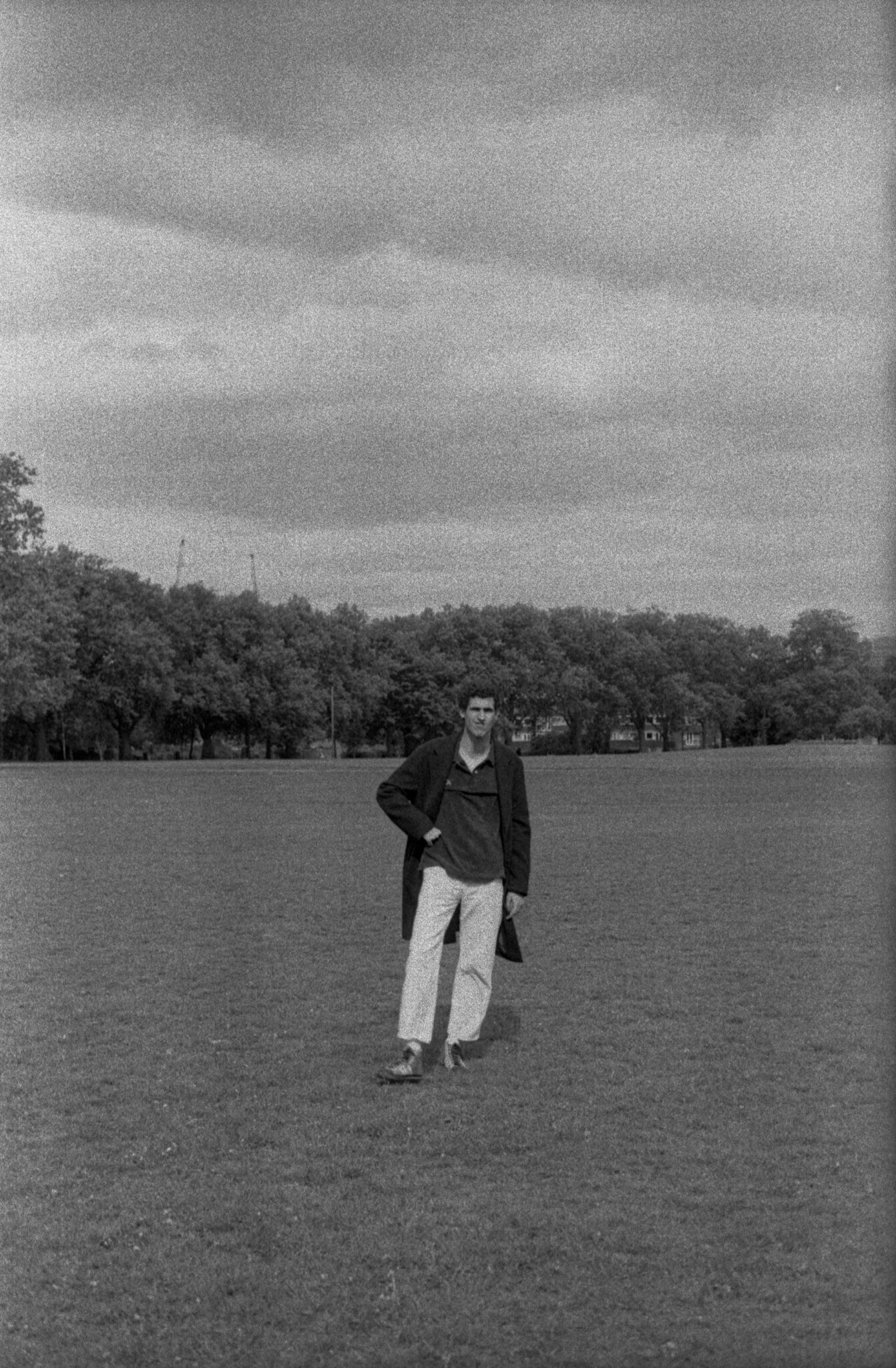
How was the week of the album release?
It was a mess. It’s madness. Because as I release independently, it was me who put the songs on the platforms and that takes time. I had to postpone the album release because of that. At the same time, it was epic. Epic because you let go of the project. You can’t work on it anymore. You’re there working on something very intensely for two and a half years. And then you release it. Every time I release music it’s a statement of who I am. So, I have to be very careful with what I release.
Your first concert. How was the whole process of setting up and preparing for the concert?
It was thinking about what we wanted to present, what we wanted to do, and who would be the people to perform this. And then we went for a few days to my house in Comporta and we stayed there thinking about what it would be like to play my album live. Since we started playing my songs live with real instruments, I feel that the album has gained a lot (Stckman controlling everything, Kyle Quest singing, Velhote do Carmo on guitar and bass, Carl Karlsson on keys, and Zé Salgado on keys and guitar). It takes on a dimension that I didn’t have. Because if I limited myself to playing my songs in DJ sets, I wouldn’t get beyond that. I put the band together to show that this is something seriously done. It was exhausting, we rehearsed a lot. And it still doesn’t always come out right.
I was thinking of eventually recording a live concert for Youtube to remember later. I like to record things and take pictures for memories. I also have tattoos of those moments, moments in my life that I like to mark because then they take me back to those times. My album takes me back to the pandemic.
“Remember nature.” You have that tattooed. Why?
It’s the name of our first Afternoon Friends film. The end of the movie is me doing the tattoo. I did it so we could have a good ending to the movie. It’s a film that’s only been shown once in its life at a party we did at the Cosmos. And it’s not going to be shown again. I like the fact that it was something from that moment, very intense, that it’s over, but it was epic. Those who saw it saw it, and those who didn’t, didn’t.
How was working with Kyle Quest (Diogo Braga)?
He was the first person that I collaborated with in person and it worked. Since the first song. We work well, we are accomplices and we make a lot of music together. And the fact that I was in Lisbon and I had a studio at the time meant that we worked very well and spent a lot of time together, so nowadays we work very well.

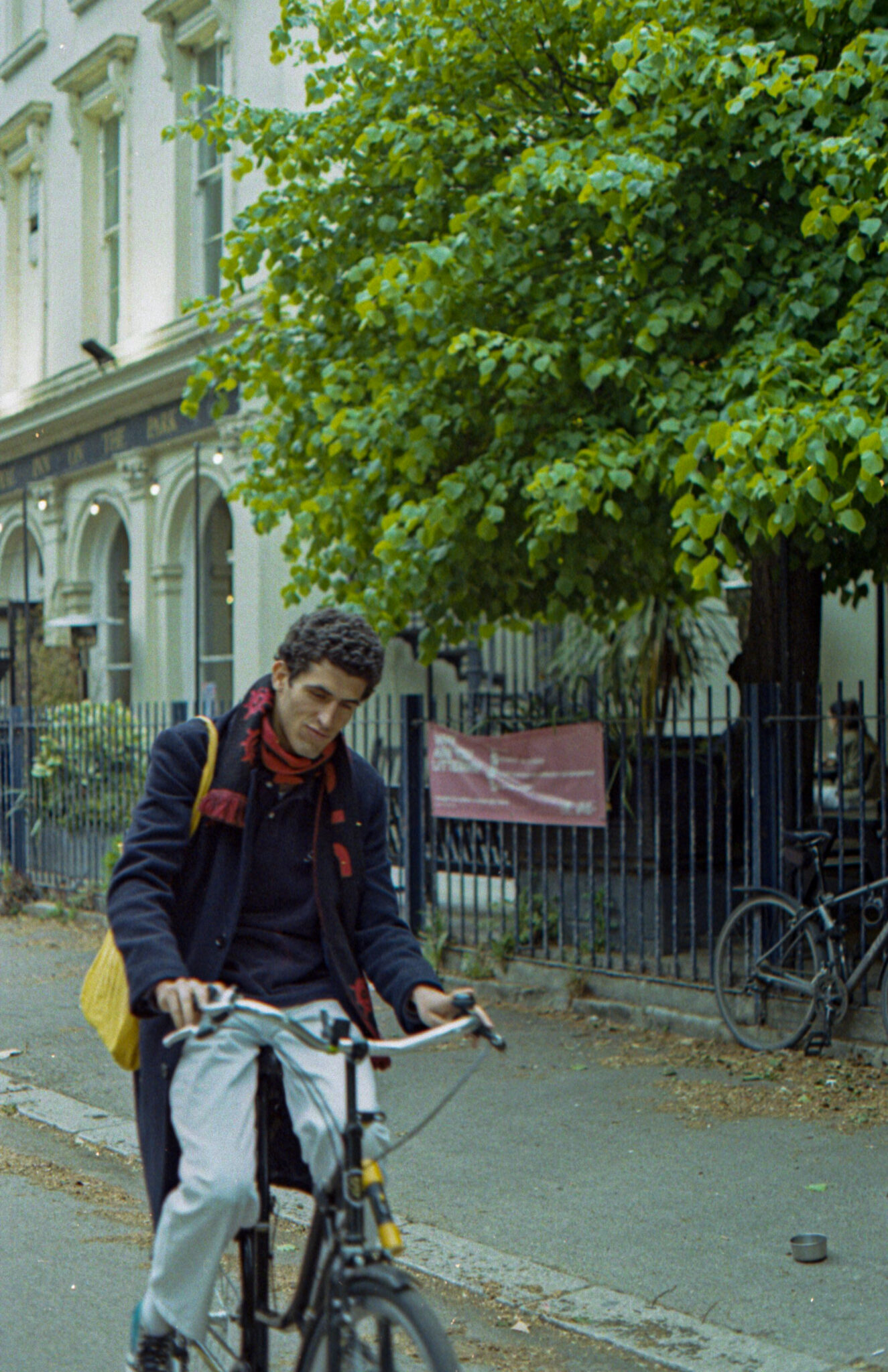
What is your favourite song on the album?
The best song on the album in terms of sound, in terms of pop construction is ‘automatic’. It’s the one with the most changes and it has two parts.
“space disco” is the one I like the best. It’s more Stckman. It’s basically the Stckman that I know. And it’s a way for me to show who I am in a nice way. This song was born from a three-hour jam with Carl Karlsson in my studio. I selected a few minutes of that jam and made the song.
What is Afternoon Friends?
Afternoon Friends is a platform I created to create scenes. Anything I create I can say is from Afternoon Friends. If I want to create a brand it’s called Afternoon Friends, if I want to make a film it’s by Afternoon Friends. It’s something for me to express myself without being Stckman. But at the moment it’s a bit on hold.
What happened to Afternoon Friends Volume I?
Afternoon Friends Volume I is something that will come out eventually. That’s the project. That one is going to take time. It’s a really big scene.
What are the best albums ever for you?
Milestones by Miles Davis.
Flowerboy by Tyler, The Creator.
Light Upon The Lake by Whitney.
Tribute To The Martyrs by Steel Pulse.
Soundtrack from The Duality Double Play by Larry Heard and Loosefingers.
Milestones by Miles Davis.
Flowerboy by Tyler, The Creator.
Light Upon The Lake by Whitney.
Tribute To The Martyrs by Stell Pulse.
Soundtrack from The Duality Double Play by Larry Heard and Loosefingers.
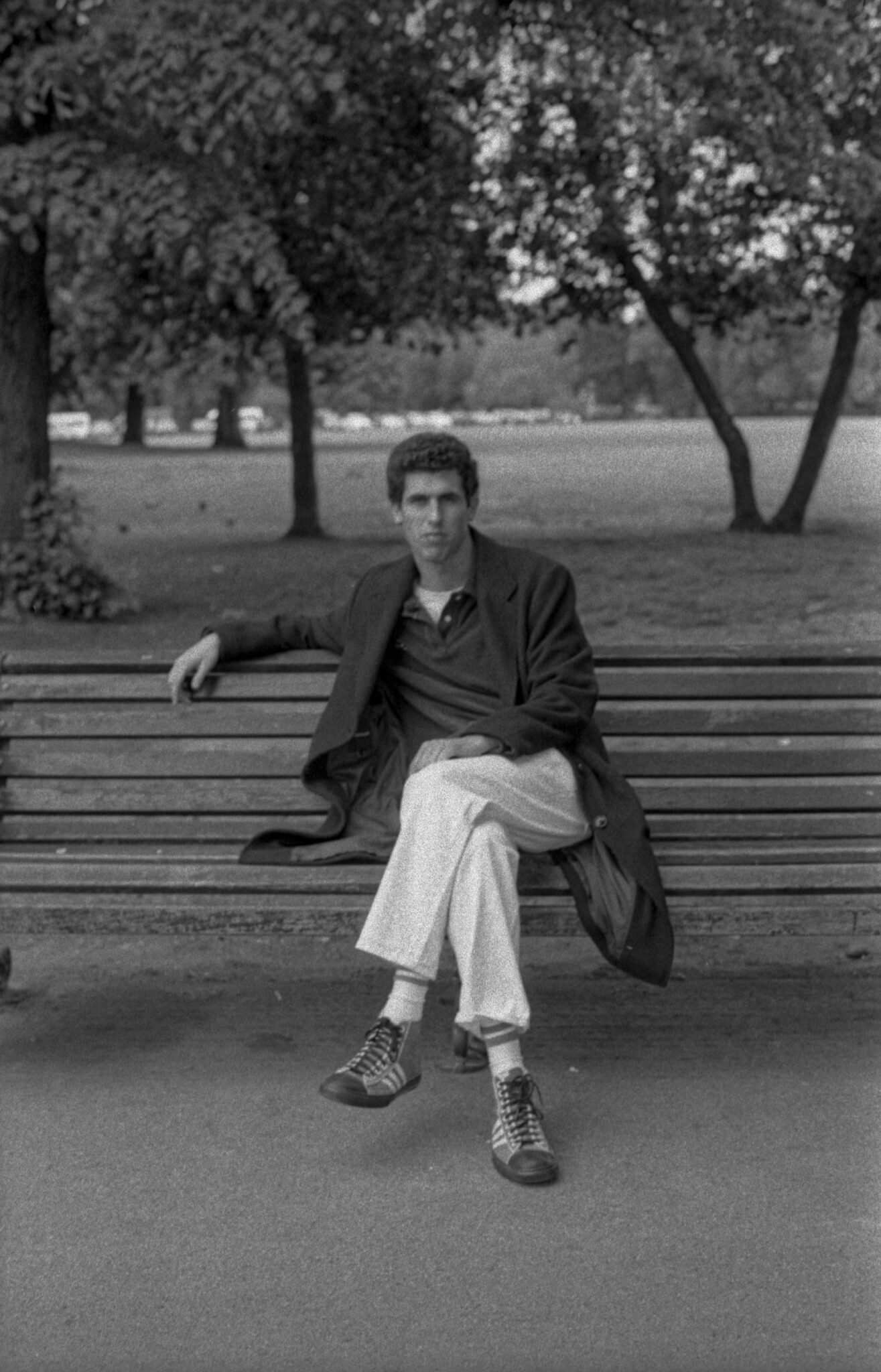

What does the BETWEEN project that you co-founded consist of?
BETWEEN is a baby that I have now. It’s a couple of parties that I organize with two friends of mine. Guigas and Tomás Portela (Ozmin). They’re an evolution of the parties we used to throw in the studio into something real, true, and with serious investment. It was born from the need to have more parties in Lisbon. Parties that are seen a lot abroad but barely exist in Lisbon. We want this to become a more recurrent culture here. Above all, we want to establish a culture of going to parties for the artists and for the party itself. As there are three of us, each one helps with their strongest points. I’m not a good person with numbers, and I’m not very realistic. And they help me to keep my feet on the ground.
What made you come to London in the first place?
I wanted to leave Portugal to study. One of the options was New York or London. Because of the pandemic, we chose London because it’s closer. I also have lots of gigs in Lisbon so it’s easy that way.
I’m living alone for the first time. I’m an organized person, I know what I can do, I know what I can’t do. I’m doing my thing. I don’t think I’ll be coming home anytime soon. Here you have a world market in just one city. A 40-minute cycle ride away and you’re in a reggae zone, or in an area where the scene is electronic music. In Lisbon, there’s everything but in a small version. That’s why I came here. I came to gain dimension. This city has a very fast pace and I’m a very fast person and I like to do lots of things, so I’m very well suited to London.
I’m in London studying, making music, growing, and evolving. So that when I release something it will be a statement. I want it to be something with level and better than the previous releases. Here in London, I’m just a guy who lives in a house, makes music, and has his schedule. That’s what I wanted deep down. I haven’t felt this normal for a long time.
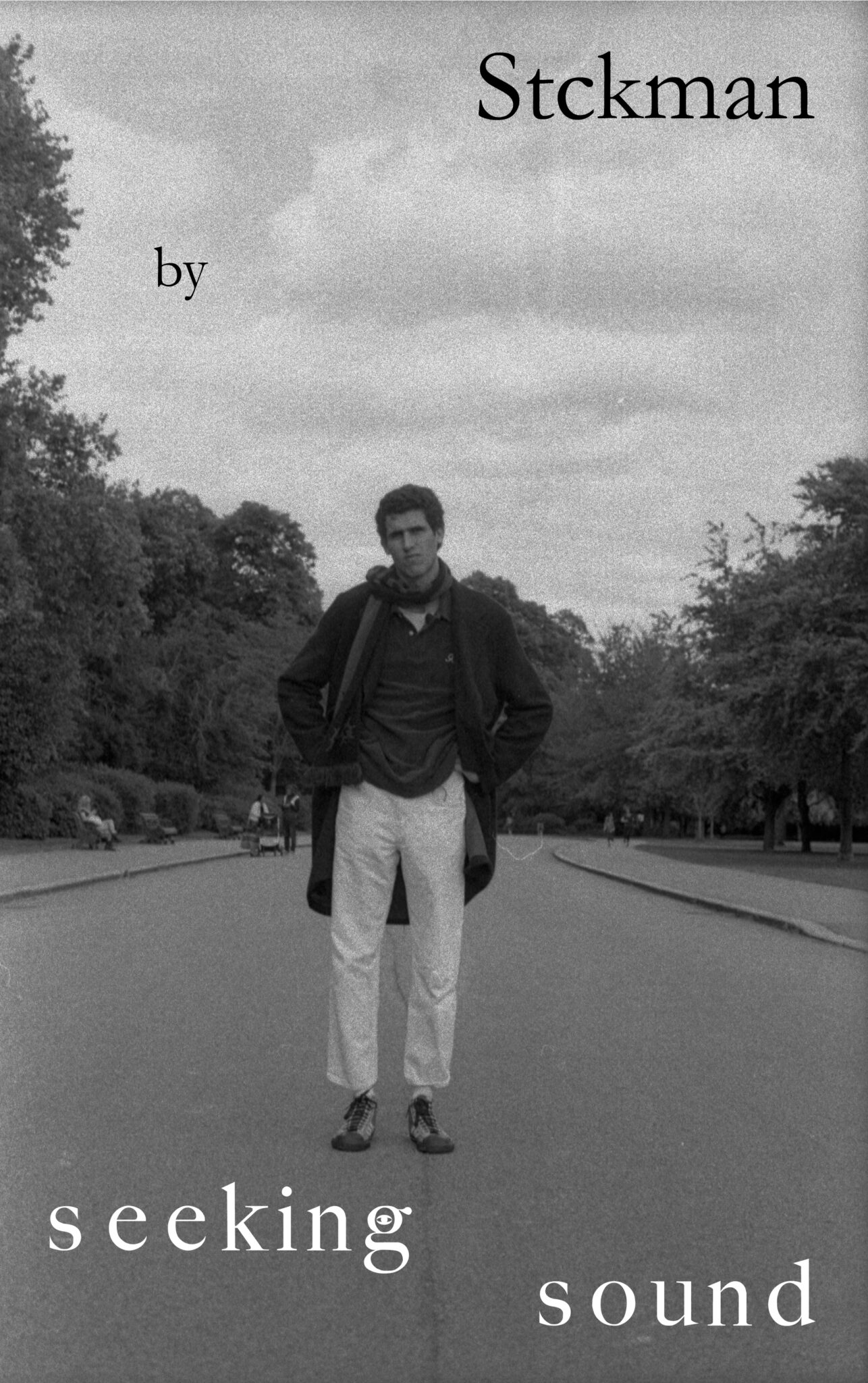
Since our conversation, Stckman played his live concert with his band at Collect Culture Events, Jardim Sonoro, and Web Summit.
Stckman played DJ sets at Nos Alive and Meo Sudoeste, which are two of the biggest music festivals in Portugal. Nuno also played some sets at an ONQ party in London, and at the NYE party at Capitólio.
His baby project BETWEEN has been flourishing in the last year. They have organized several parties throughout the last year and Nuno played in venues such as Musicbox, Doca da Marinha, Tokyo, and Kubu. Tonight will be the first act of BETWEEN of 2023 as Stckman and Guigas are getting ready to play at Musicbox.
He might not have been releasing new music, but he has been studying Audio Production at SAE in London where he has been refining his sound and constantly looking for new records to play on his sets.
You can find Stckman on Instagram.
